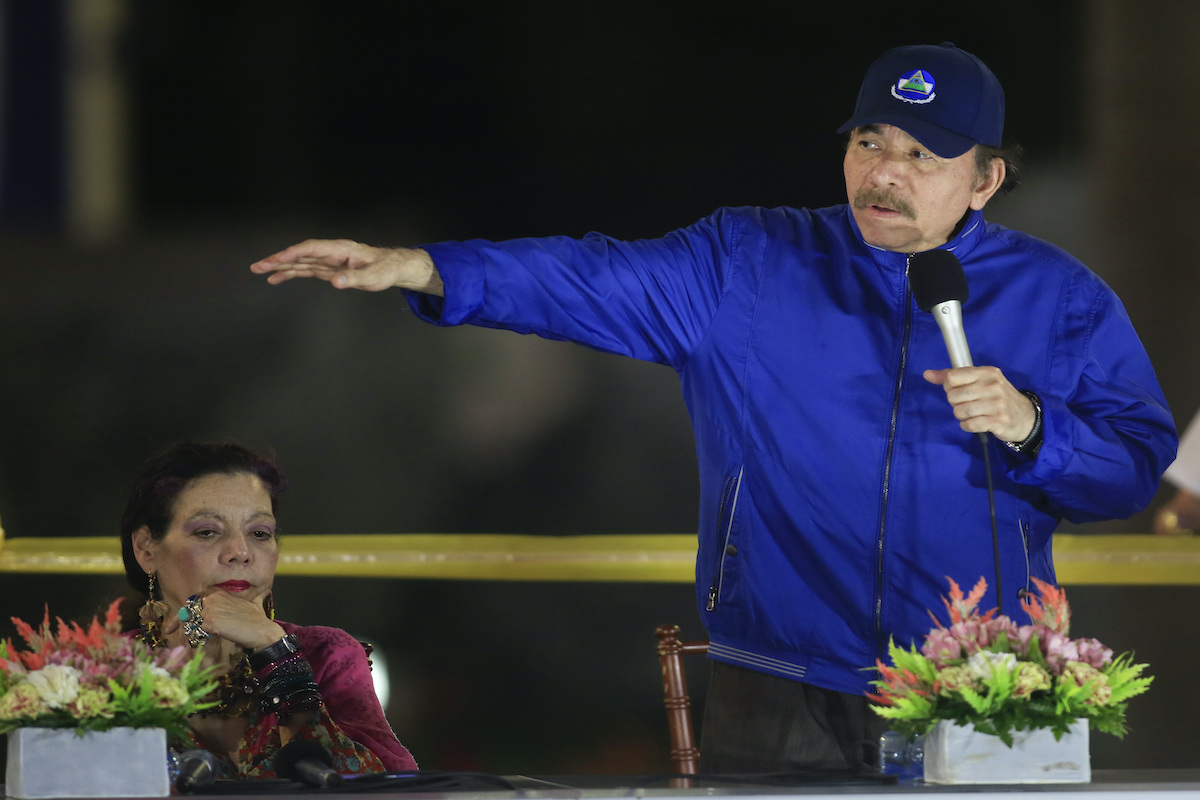

Nicaragua’s President Daniel Ortega speaks next to first lady and Vice President Rosario Murillo, left, during the inauguration ceremony of a highway overpass in Managua, Nicaragua, Thursday, March 21, 2019. (AP Photo/Alfredo Zuniga)
Welcome back to El Faro English.
Nicaragua, in Brief: The results of the November 7 presidential elections are now clear: Daniel Ortega and Rosario Murillo will run for reelection without any legitimate opponents.
The Latest From Nicaragua
The last hope for any semblance of free and fair elections in Nicaragua in November has vanished after the government of Daniel Ortega and Rosario Murillo canceled the legal status of the last opposition party, Citizens Alliance for Liberty (ACxL), on Friday, August 6.
Just 10 days before, ACxL announced its presidential ticket: businessman and former Contra leader Oscar Sobalvarro as presidential candidate, alongside running mate and former Miss Nicaragua Berenice Quezada. The government then placed Quezada on house arrest for terrorism charges, canceled the party, thus making the candidates ineligible for election, and stripped the party president of her Nicaraguan citizenship.
These actions underscore the government’s “determination to govern without political legitimacy, toughening the repressive strategy to extreme levels in order to sustain a totalitarian regime,” writes exiled Nicaraguan journalist Carlos Fernando Chamorro in Confidencial.
Sanctions Upon Sanctions
On August 7, U.S. Secretary of State Antony Blinken called the cancellation of ACxL a “final blow against Nicaragua’s prospects for a free and fair election.” The day before, the U.S. Senate voted to send the Renacer Act to the House of Representatives. Among other provisions, the bill calls for a federal review of the Central America Free Trade Agreement (CAFTA) and sanctions coordination with Canada and the European Union.
The same day as the passage of Renacer, the State Department announced sanctions of 50 immediate family members of Nicaraguan politicians, judges, and prosecutors which the department deems to have directly contributed to thwarting free and fair elections.
On August 2, the European Union announced sanctions to freeze the assets and forbid citizens and companies from transferring funds to eight high-level Ortega officials, including Murillo and one of the first couple’s sons.
Even a long-time Ortega ally has now joined the international criticism of the regime. Former Brazilian President Lula da Silva urged Ortega “not to abandon democracy” in an interview with Mexican TV program Largo Aliento. He emphasized the importance of alternating leaders for a healthy democracy.
Fanning a Nicaraguan Exodus
The Ortega-Murillo regime has extirpated any viable opposition candidates, muffled independent press, and scared protesters away from the streets. More than 30 presidential candidates, activists, and opposition leaders have been detained in the past two months and the repression is fueling an exodus of Nicaraguan migrants heading for the U.S. The international community has reacted time and again with condemnation, sanctions, and threats of further sanction or economic isolation.
As international pressure mounts, Ortega issued a presidential decree August 5 ordering international governments and organizations to request permission from the Nicaraguan government before issuing international prizes to Nicaraguan citizens.
Nicaraguan writer and vocal critic of the Ortega administration, Gioconda Belli, compared the decree with the laws of Macondo, the fictitious setting of Gabriel Garcia Marquez’s novel One Hundred Years Years of Solitude. “The prizes that we win as Nicaraguans for our personal merits belong to us personally,” she tweeted. Nicaragua has become a country “that is not for anyone if it isn’t for them,” Belli writes in Confidencial.
Con ese absurdo Art 24 que salió hoy, el Estado Nic se atribuye facultades que no posee más que en el imaginario absolutista de la pareja en el poder. Los premios que ganamos los nicas por méritos individuales nos pertenecen a título personal. Nada de eso les toca aprobar. ?
— Gioconda Belli (@GiocondaBelliP) August 6, 2021
“Maintaining the structures that have ensured impunity cannot be the basis for building the future of the country,” said Erika Guevara-Rosas, Americas director at Amnesty International. “To put an end to the crisis, human rights violations must be stopped, those identified as suspects must be investigated impartially and promptly, and the victims must obtain truth, justice and reparations.”
Despite their names on the ballot, the first couple’s legitimate rule has already ended, writes Chamorro, the exiled Nicaraguan journalist, in a column for El Faro.
“The real crossroads for Nicaragua are not the results of the elections on November 7, which will worsen the national political crisis,” he writes. “But rather how to initiate a democratic transition and call new elections in 2022, without Ortega and Murillo.”


